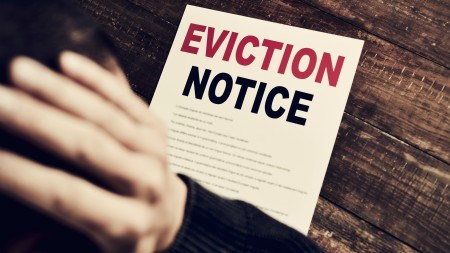A recent Constitutional Court judgement has ruled that residents cannot be evicted if they would be left homeless. The onus falls on the municipality to provide housing before they vacate the property.
Against the backdrop of the uncertain South African economy there is one question that is regularly asked: what is the best investment to make? What is a solid investment that is robust, secure, proven, will weather economic storms and will stand the test of time? According to many self-help books and billionaire biographies the resounding response is to invest in property.
What better way to make money than to invest in an appreciating asset that someone else, aka your tenant, is paying for? Enlightened landlords know that the South African rental industry is not without its challenges, not least of which is the hiccup of evicting non-paying tenants. Up until now, evicting someone from your property has been a well-travelled road of following the procedures, complying with PIE and eventually, armed with your court order, booting the freeloaders off your property. Without a doubt it’s a costly and lengthy process, but the promise of a legally enforceable eviction order at the end of it makes it all worthwhile. Until now. The Constitutional Court has just added a detour on this road to eviction. And who knows where it’s going to lead?
While we don’t know where this story ends, we do know where it started. Sometime during 2012 Mr Maseko decided to put his pension funds to work, and what better way than to follow the lead of billionaire property tycoons by investing in property? Even better, he found an apartment block being sold by a company in liquidation, giving him the upper hand negotiating the price. And being rather dilapidated the property gave him the opportunity to manufacture asset growth by renovating then renting out his shiny new units for a higher rental. One small problem: the property was already occupied. By no less than 184 impoverished individuals who had no intention of going anywhere.
2013 saw the liquidators and Mr Maseko wasting no time in starting the eviction process. In January the termination letters were delivered. And after meticulously following the same exasperating yet effective process that many landowners have used, the High Court awarded the coveted prize: an eviction order requiring all 184 unlawful occupants to move out.
For most landowners, an eviction order represents the end of their problems. For Mr Maseko, it was only the beginning. His unwanted occupants, somewhat annoyed by this turn of events, decided to challenge the eviction.
They were undeterred by successive failures in the High Court and Supreme Court of Appeal, which both adjudged the eviction order to be legal and enforceable. This matter wasn’t over until the highest court of our land had passed judgment.
And so it came to pass that the Constitutional Court found itself having to pick between two opposing sides.
• The unlawful occupants argued that before a court can grant an order of eviction, the judge has to proactively consider all the relevant circumstances. And if evicting occupants may lead to homelessness then the eviction order cannot be granted.
• The liquidators and hapless Mr Maseko, on the other hand, contended that they had complied with PIE and followed the correct procedure to obtain a perfectly lawful eviction order. They argued that the occupants were unlawfully occupying the property and had made no attempts to find alternative accommodation. Added to which, Mr Maseko’s rights as owner of the property were being jeopardised, especially when viewed against the length of time this process was taking.
After much deliberation, the Constitutional Court on 08 June 2017 found in favour of the unlawful occupants. Mr Maseko’s hard-won eviction order was rescinded and the matter was sent back to the High Court so that the judge could consider all the relevant circumstances. And if eviction would lead to homelessness for any of the 184 occupants the order could not be granted until alternative accommodation could be found for them.
Here are some noteworthy observations arising from this judgment:
An eviction order can only be granted after the judge is completely satisfied that it would be just and equitable and would not result in the occupier becoming homeless, regardless whether the occupation is unlawful.
This judgment requires judges to play an investigative role before granting an eviction order. This is a considerable departure in conventional court proceedings. Traditionally, a judge hears both sides of the dispute then makes an objective decision based on the information put forward by the warring parties. With eviction orders, the judge must now look beyond the facts and arguments presented by the desperate landlord and disgruntled tenant. The judge has to adopt a Sherlock Holmes alter-ego to question, scrutinise, probe and interrogate every detail.
The Constitutional Court noted that this judgment is not intended to quash the rights of landowners in favour of unlawful occupants. It merely delays the landowner’s ability to exercise their property rights until the court has comprehensively considered the matter.
This case spanned four years, during which the unlawful occupants received free legal representation.
Meanwhile Mr Maseko’s legal costs mounted so astronomically that by the end of this drawn-out dispute his lawyers eventually agreed to continue representing him on a pro bono basis because he had run out of money.
This judgment is likely to have implications on our property industry, possibly resulting in eviction proceedings becoming an even longer, more complicated process than they already are.
Our courts have been magnanimous in noting that PIE “infuses elements of grace and compassion”, and promotes “a caring society based on good neighbourliness and shared concern”. Sadly, their utopian ideals do not pay the bills, and our banks and municipalities are not as generous in their approach. While our judges invest in Sherlock Holmes-inspired capes, caps and magnifying glasses, landowners remain liable to pay all legal costs, mortgage bonds, rates, levies, water and electricity bills relating to the unlawfully occupied property.
Does this mean that property is no longer a good investment? Not at all! Property remains a great investment opportunity for people looking to broaden their investment portfolio. What this judgment does, however, is remind us that not all property – and not all tenants – are created equal. Property owners would be well-advised to carefully consider both the property they purchase and the tenants they put in. We must stress that the best time for a landlord to address their risk is at the beginning of their lease. While there’s no guarantee that your tenant won’t turn out to be a bad egg, you can mitigate your risk by making sure that your tenant checks out. Get your tenant to sign a comprehensive application form, verify the information, and conduct credit checks and references before you enter any agreement of lease or hand over the keys.
Article by Kerry Jack
Kerry Jack is a qualified attorney with over 20 years’ experience spanning legal practice, corporate legal advising and risk management consulting. She has interests in Agreements Online, a website that has provided legal agreements and templates to businesses and individuals for ten years.





